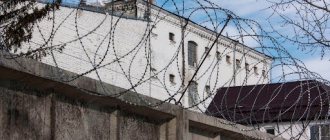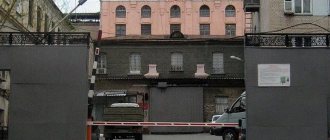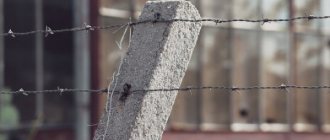Legal basis
The main goal of the Russian Ministry of Internal Affairs is to prevent the commission of crimes. For this purpose, specialized bodies (criminal enforcement inspections) are created in the state. They carry out punishments against convicted persons, excluding their isolation from society.
Legislation in the penal sphere is designed to fulfill certain tasks:
- regulation of law and order, conditions for the execution of sentences;
- determining ways to correct convicted people;
- protection of the rights, interests and freedoms of persons serving a deserved sentence;
- providing assistance to convicts in the matter of their social adaptation.
The above tasks and goals are spelled out in the Criminal Executive Code (abbreviated as PEC) of the Russian Federation. This is the main document in the areas of criminal and executive legislation.
Bodies executing punishment
In the 30s of the last century, institutions that carried out punishments imposed on convicted persons without isolating them from society were included in the system of the USSR Ministry of Internal Affairs. Until 1999, the activities of the criminal executive inspections (abbreviated CII) were also determined and controlled by the bodies of the Ministry of Internal Affairs. Such institutions were independent structural units; police officers worked there. At the beginning of 1999, by Decree of the President of the Russian Federation, the penal system was transferred to the jurisdiction of the Russian Ministry of Justice. This reform was justified by the desire of the Russian Federation to become an equal member of the international community. Today, the penal inspection of Russia is a multifunctional institution that combines the functions of executing punishments and using criminal legal measures. Its activities are aimed at preventing possible offenses in the future.
Holiday traditions
At the official level, March 12 was included in the holiday calendar in 2010. On the day of the formation of the UII, it is customary to hold festive events. Current employees, their families and veterans of the inspection are invited to attend.
On this day, UII employees accept congratulations and well-deserved words of gratitude for their necessary and useful work. They are given valuable gifts, and gratitude is entered into their personal file. A worthy reward for service important to society will be medals and commemorative insignia, which can be purchased on the Chelznak store website.
Penal system: structure
The penal system of the Russian Federation has traditionally included bodies and correctional institutions that carried out criminal punishment imposed on convicted persons. But along with them, there were other services that were responsible for the implementation of criminal law measures not related to imprisonment. Current legislative acts determine the structural parts of the penal system of the Russian Federation. It includes:
- institutions that carry out punishments;
- territorial authorities;
- federal bodies authorized in matters of execution of punishments.
According to the decision of the Russian government, the penal system may have additional components: pre-trial detention centers, medical, design, educational and other institutions. The legislative acts of the Russian Federation prescribe services designed to carry out criminal penalties. This includes the penal inspection, which carries out punishments without isolating convicted persons from society.
Directorates and divisions
The department consists of 19 departments (UFSIN - can be deciphered as the Federal Service Department) of a basic nature. Everyone is engaged in the execution of their powers. The following controls are available:
- GUFSIN (stands for Main Directorate);
- controlling organizations that carry out established punishments that are not related to restriction of freedom;
- control of places for temporary detention of defendants;
- execution of court decisions;
- on labor support for convicts and labor adaptation;
- for communications;
- on security of the Federal Penitentiary Service;
- to check compliance with the regime and its implementation:
- providing convoy and security for convicts;
- on the main affairs of departments;
- on organizational issues;
- legal;
- on working with new employees;
- on issues of financial condition;
- provision of finance and other resources for the rear;
- on the functioning of the real estate department;
- medical care for personnel;
- protection of state secrets.
Each of them performs its own separate function, which creates the correct distribution of the organ’s work and contributes to excellent efficiency.
We can also distinguish four main divisions, each of which is engaged in its own work. The first is the FSIN bodies themselves. This may include regional employees and central statements. Main departments and departments related to the constituent entities of the Russian Federation. Territorial bodies in their structure practically do not differ from the central apparatus.
The second is a unit responsible for carrying out the sentence of isolating defendants. Their main task is to regularly inspect correctional facilities. This includes both places of deprivation of liberty and correctional centers. Full control of all points specified in the court decision is carried out.
Here is a breakdown of content types:
- The colony . Imprisonment for a prescribed period or for life serving the sentence.
- Jail . Imprisonment with restriction of the movement of criminals within the territory of the institution. In prisons, stricter methods are used to isolate those being punished from society.
- Detention center . Maintenance of persons awaiting trial and sentencing, as well as convicted persons awaiting transfer to an institution to serve after the sentence has been imposed.
- Arrest houses . Keeping in complete isolation from society. Here they serve sentences from one to six months.
- Correctional Center . Provided for convicts sentenced to forced labor. There are places on site to isolate particularly aggressive offenders.
The third is the criminal-executive inspection. Deals with officials who have broken the law. Ensures that these citizens do not occupy relevant positions. This also includes criminals sent for compulsory treatment. The fourth is institutions subordinate to the FSIN. Educational institutions and research centers related to this department.
The main departments include: Moscow, Sverdlovsk, Chelyabinsk, Perm, Krasnodar, Omsk, Volgograd, Novgorod, Primorsky, Saratov, Belgorod, Yekaterinburg, as well as departments of the Republic of Bashkortostan and the Krasnoyarsk Territory.
UII tasks
- Execution of established punishments in the form of organizing compulsory labor, deprivation of the opportunity to occupy certain positions, or carry out specific activities.
- Control of conditionally convicted persons whose serving of the established sentence has been suspended by the court.
- Measures to prevent offenses by persons who are registered with the UII.
Work in the criminal-executive inspection has some peculiarities. This service is designed to carry out punishments without isolating individuals from society, to control previously convicted people and to prevent them from committing offenses in the future. At the same time, employees of the Penitentiary Inspectorate must act strictly in accordance with acts, orders, instructions of the Ministry of Justice, the Federal Penitentiary Service of the Russian Federation (abbreviation FSIN).
Structure and powers of the Federal Penitentiary Service
Criminal-executive inspections are territorial divisions of the Federal Penitentiary Service at the local level, mainly at the district level. Above are the Departments of the Federal Penitentiary Service, which were created and operate on a regional basis.
Regulatory framework:
- Criminal Executive Code (PEC).
- Criminal Procedure Code (CPC).
- Decrees of the Government of the Russian Federation.
- Departmental regulatory legal acts through the Ministry of Justice of the Russian Federation and the Federal Penitentiary Service.
In total, there are about 2.5 thousand UIIs in Russia. Basically, these bodies register persons who have received a suspended sentence of imprisonment, a suspended sentence, or have been sentenced to compulsory, forced, correctional labor, as well as additional types of punishment.
What does the criminal enforcement inspectorate do? Key Responsibilities:
- Keep records of supervised persons, carry out explanatory and educational work with them, monitor their behavior at the place of work, study, residence and compliance with the restrictions established by the court.
- Prevent the commission of crimes and offenses by controlled persons.
- Provide conditions for serving sentences in the form of forced, corrective, and compulsory labor in cooperation with other state and local authorities.
- Carry out initial measures to search for controlled persons who are evading serving their sentences and (or) have fled from their place of residence in an unknown direction.
- Submit, in accordance with the established procedure, submissions to the court on issues of further serving the sentence and release from it, establishing and canceling obligations (restrictions) for convicted persons.
- Coordinate or allow convicted persons certain actions that are related to serving their sentence and compliance with the obligations (restrictions) established by the court and the law.
The specific powers of the UIN (rights and obligations) depend on what kind of sentence the convicted person is serving.
Probation
Persons who received suspended imprisonment with a probationary period are the main contingent registered with the Penitentiary Institution. In this case, the penal inspection operates at the place of residence of the convicted person.
How is a suspended sentence executed?:
- A probationer is required to register with the correctional institute at his place of residence (registration) and regularly go to check-ins. How to properly report after a verdict is decided by the court or, if the court has not determined, by the Criminal Investigation Department. In any case, everything must be explained by the inspector during the convict’s first visit to the inspectorate.
- Accounting is carried out personally. Each convicted person has his own personal file. A prison inspector has the right to check the working (study) conditions of a convicted person, visit him at home, and request characteristics regarding lifestyle and behavior. Penitentiary inspectors have the right to involve internal affairs bodies in carrying out their functions. Usually the work is carried out in cooperation with local police officers.
- If the court assigns certain duties to a convicted person, the Criminal Investigation Department verifies their fulfillment. If additional types of punishment are imposed, the inspector must monitor their execution.
- As soon as the probationary period has passed and there are no grounds for its extension, the convicted person is removed from the register and is considered to have served his sentence.
As an incentive measure, the correctional inspectorate has the right to prepare a submission to the court for the early (before the expiration of the probationary period) release of the convicted person from punishment.
Mandatory work
When a sentence is imposed in the form of compulsory labor, the convicted person must be brought to it within 15 days from the date of receipt of a copy of the sentence by the Penitentiary Inspectorate. Accordingly, within the same period he must register with the inspectorate.
In addition to all the functions that the Inspectorate performs as part of the control over probationers, during compulsory work the inspectorate must:
- coordinate the list of types of work and objects for their implementation presented by the municipality;
- keep records of the time worked by the convicted person.
Serving compulsory work is similar to performing ordinary labor functions. Only this is not the main work, but, let’s say, additional work. As a rule, we are talking about unskilled labor, often at housing and communal services enterprises. Typical options are garbage removal, snow removal, etc. The convict works for free and is obliged to comply with labor regulations and discipline. His main task is to work the assigned number of hours conscientiously and without violations. Accounting and control of serving the sentence are carried out mainly based on information provided by the employer.
Forced labor
Forced labor is served in special centers at the place of residence of the convicted person or, if the first is impossible, in a neighboring region. The convicted person must arrive at the appropriate correctional center independently on the basis of the order received from the correctional institution. The order is issued within 10 days from the moment the inspection receives a copy of the court verdict. If the convicted person is in custody, he goes to the correctional center under escort. If he evades receiving an order or fails to comply with it, the convicted person is forcibly sent to the place of serving his sentence.
Correctional work
Correctional labor is a less severe punishment than forced and compulsory labor. The convicted person can work at his place of work. And only if there is no such thing, the UII will direct him to an object included in the list prepared by the local authorities. Typically, such objects and types of work are not very different from those included in the list for serving compulsory work.
The powers of the Penitentiary Inspectorate in relation to those sentenced to correctional labor are almost the same as in the case of compulsory labor. The inspectorate registers the convicted person, conducts explanatory and educational work with him, and monitors the progress of serving his sentence. The convicted person receives a salary, but minus the withholding established by the court. He cannot resign without the permission of the Executive Directorate.
Restriction of freedom
Restriction of freedom is a relatively new type of punishment. The UII is entrusted with full supervision of his departure in accordance with the established procedure and conditions.
Within 15 days from the date of receipt of a copy of the verdict, the Penal Inspectorate sends the convicted person a notice of the need to appear at the inspection and register. On the first visit, the convict is photographed and fingerprinted. From this day the period of restriction of freedom begins.
The sentence is served at the place of residence. The main task of the convicted person is to appear at the correctional facility on time for registration and comply with all restrictions established by the court. Typically, responsibilities include not leaving your permanent place of residence, not visiting certain places, getting a job, and behaving positively. In exceptional cases, a convicted person may violate the established restrictions, but not all of them and only with the consent (permission) of the correctional inspector.
Additional penalties
If, simultaneously with the main punishment, the convicted person is given a fine or deprivation of the right to hold certain positions (engage in certain activities), then the responsibilities of the Penal Inspectorate include monitoring the serving of these types of punishments. It is carried out as part of monitoring the execution of the main punishment, but is monitored separately. Under certain conditions, problems with the execution of an additional punishment may serve as a factor for revising the main punishment in the direction of making it more severe. In the case of suspended imprisonment, the probationary period may be extended or the suspended sentence may be replaced with a real one. All this is done by the court on the proposal of the UII.
Other powers of the UII
Other powers of the UII include accounting and control of persons:
- Those released from serving their sentences on parole.
- Released from places of imprisonment due to the replacement of punishment with a more lenient one.
- Exempt from punishment due to serious illness or disability.
- Those sentenced to a suspended sentence.
With the advent and active spread of the preventive measure in the form of house arrest, the police department was also assigned the responsibility of monitoring suspects and accused persons to whom such a measure was applied by the court.
Principle of operation
Directorate of Criminal Execution Inspection - FSIN for a specific area. It monitors the activities of the bodies executing the established punishment. Employees of the Penitentiary Inspectorate are faced with a growing problem every day - the number of drinkers is increasing. More and more crimes are being committed by people while under the influence of alcohol. And when they are sober, they don’t even understand how they could decide to do such an act. Therefore, the main task of the correctional institute staff is to systematically monitor such persons, in particular, to assess their mental state. Inspectorate specialists admit that you need to be able to find a common language with such people, and not demonstrate your power over them. In addition, correctional institute employees supervise convicted persons who are exempt from forced serving of their sentences. The main task of government agencies in this case is to assist people who have previously committed a crime in the matter of their social adaptation.
Preventive supervision
The Russian Penal Code obliges authorized bodies to carry out preventive supervision over released persons who have served their sentences in places of deprivation of liberty. This procedure is carried out by the criminal-executive inspection to prevent future crimes by these individuals and to provide them with the necessary preventive support. At the same time, preventive supervision is carried out without humiliating the dignity of previously convicted persons. The legislation establishes a certain procedure for performing this procedure:
- The court decision on the implementation of preventive supervision is sent to the department of the correctional institution at the place of residence of persons who have served time in places of deprivation of liberty.
- Inspectorate employees warn the person being released about responsibility for failure to comply with the requirements established for his preventive supervision and about the consequences of evading this procedure.
- If the supervised person does not arrive at the chosen place of residence at the appointed time, the Criminal Investigation Department puts him on the wanted list.
Employees of the criminal-executive inspection must carry out systematic monitoring of persons subject to preventive supervision.
Information about the activities of the UII
In relation to a specific convicted person or a person under house arrest, the powers of the supervisory authority are exercised by the police department at his place of residence. Thus, it is necessary to register, go to check in, provide documents and resolve all other issues with your local police department.
To find out the address of the Penitentiary Directorate and other information, you can go to the official website of the Federal Penitentiary Service of your region and find a section that provides information about the structure of the Directorate and its subordinate bodies. Since police officers usually work in conjunction with local police and, in particular, local police officers, information can be clarified at the local police department. Sometimes services are even located in the same building next door.
All information about the procedure for serving the sentence, conditions, rights and responsibilities should be obtained from your correctional inspector. At the first stage, it is important to register on time and comply with all regulations. When changing the place of residence, if this is allowed by the order of serving the sentence, the correctional institution is also changed - the case is redirected according to territoriality.
Means of supervision and control
Every day of the penal inspection begins with the control of convicted (released) persons. In their work, UII employees use electronic methods of supervision and control. These include technical means used by government agencies when exercising control during house arrest; in cases of imprisonment. Electronic monitoring of controlled persons involves the use of the following equipment:
- stationary control devices (SCU);
- mobile control devices (MCU);
- electronic bracelet – EB.
I&C systems are used for continuous round-the-clock monitoring of the presence of certain persons in an established territory. The device also gives signals if the person under control makes attempts to get rid of the electronic bracelet. MKU is an electronic device that must be carried along with the electronic device. It allows you to track the location of the convicted person using the GPS or GLONAS satellite system.
More information about the type of activity
The service carries out its work by order of the President dated March 9, 2004. To understand verbatim information about the actions of the Federal Service, it is worth studying these legal acts.
The list of powers of the FSIN includes:
- Exercising control in places intended for serving the assigned sentence. This includes not only punishments in the form of restriction of freedom, but also those that help ensure law and order.
- Referral and placement of criminals to court-appointed facilities. If any movements are necessary, organization and implementation of safe transportation.
- Development of acts of pardon for convicted persons. The FSIN has the appropriate voice and the right to conduct examinations.
- Training of new employees and their training in specialized institutions, for example, at the FSIN Academy. If a person has not graduated from such an educational institution, employment is possible in accordance with the requirements specified in the documents. An employee may be transferred to another position that is more appropriate to his skills.
- Creation and reorganization of facilities intended for the execution of assigned sentences.
- Distribution of finances, as well as other funds allocated by the state for the development of this government body.
- Execution of orders for the construction and repair of buildings associated with the Federal Penitentiary Service.
- Receiving any information requests necessary to impose punishment on a suspect.
- Reception and consideration of complaints from citizens.
The FSIN has other powers that are prescribed in adopted state acts. Since the department has a fairly wide range of activities, from monitoring the execution of punishments to transportation, it is provided by the state with all the necessary resources, including cars with a special abbreviation, weapons, uniforms for employees, and so on.
Penal Inspectorate Day
The effective use of punishments, which are an alternative to imprisonment, in relation to persons who have committed crimes of moderate severity, helps protect society from the criminal and reduces the level of public criminalization. For effective control, correctional institute staff use audiovisual, electronic, and technical means of monitoring convicts. Programs for psychological personal correction are being introduced into practice. Work in the Institute is responsible, requires attention, and is associated with risk. Every year on May 7, the Russian Federation celebrates the Day of Criminal Execution Inspectorate. This is a holiday for UII employees. The penal system is constantly developing and improving. In her work, she interacts with the services of the Ministry of Internal Affairs of the Russian Federation, bailiff departments and other law enforcement agencies. The activities of the UII are also supported by district leaders and municipal administrations. This ensures the smooth operation of penal inspections and helps them to be closer to the needs of social development and international standards.
Addresses of the Departments of Execution of Punishments (Moscow)
- Federal Penitentiary Service of Russia: Zhitnaya street, building 14.
- Criminal-executive inspection (Fl 3): Yaroslavskoe highway, house 49.
- Office of the Federal Penitentiary Service for Moscow (Special Purpose Department “Saturn”): Narvskaya street, building 15 a.
- Federal government institution Criminal Executive Inspectorate (Moscow) under the Federal Penitentiary Service of Russia: Seleznevskaya street, house 26.
- Department of Execution of Punishments: Mantulinskaya street, building 24.
- Reception office of the Federal Penitentiary Service in Russia: Sadovaya-Sukharevskaya street, 11.
- Criminal Enforcement Inspectorate (Branch 22): Svobody Street, Building 11, Building 1.
- Office of the Federal Penitentiary Service in Moscow: Narvskaya street, building 15 a.
- Criminal Enforcement Inspectorate (Branch 15): Yaroslavskoye Highway, 77/2.
- Office of the Federal Penitentiary Service for the Moscow Region: Verkhnie Polya street, house 65.
- UII (Branch 1): Yasny Avenue, building 24a.
- Interdistrict criminal-executive inspection 17–18: Novoyasenevsky Avenue, building 25.
- FSIN (Branch 8): Institutskaya street, building 3, building 2.
- Federal Penitentiary Inspectorate of the Federal Penitentiary Service of Russia in Moscow (Branches 19, 20, 21): Pyryeva Street, Building 4, Building 3.
- Convoy Department under the Moscow Federal Penitentiary Service: Chaginskaya street, building 12.









